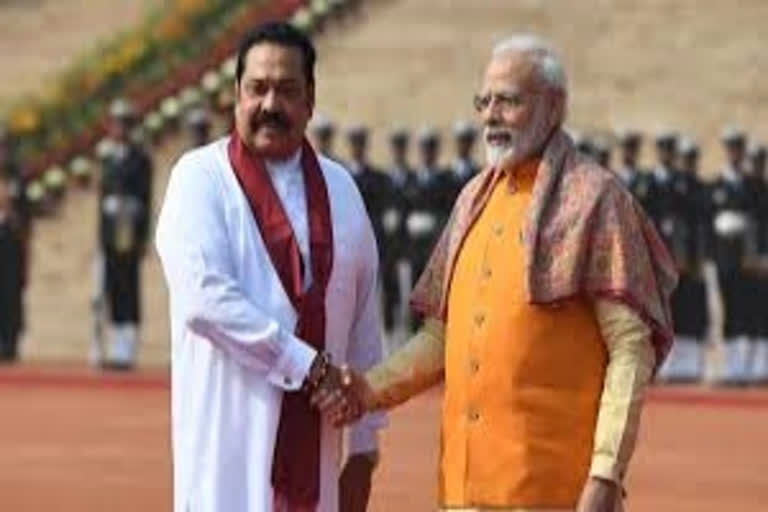New Delhi: In February this year, Mahinda Rajapaksa on his first official tour to India since being sworn in as Prime Minister of Sri Lanka was asked if the tussle over the 19th amendment clause could cause problems between him and his younger brother President Gotabaya Rajapaksa.
In his response to an Indian English daily, past President and strongman leader Mahinda who crushed the LTTE with an iron hand in 2009, replied, "No, no, no. The way the present constitution is structured and the confusion with the 19th amendment, only two brothers like Gota and I can handle this (Laughs). Otherwise, no President and PM will ever agree on this issue."
The 19th amendment would be a key focus with Mahinda Rajapaksa now having won a landslide victory with 145 seats in the parliamentary elections held on 5th August amid a pandemic.
The elections which were earlier postponed saw a nearly 71 per cent voter turnout, lower than the 77 per cent poll percentage recorded in 2015.
Incumbent Mahinda Rajapaksa contested as a prime ministerial candidate from the governing Sri Lanka Podujana Party (SLPP) from the northwestern capital district of Kurunegala.
Former President Maithripala Sirisena contested from the north-central region of Polonnaruwa while former PM Ranil Wickremesinghe and Sajith Premadasa ran from the Colombo district in the polls.
Sajith has now emerged as the chief opposition with 54 seats for his Samagi Jana Balawegaya (SJB).
The election results have come as a big shot in the arm for the President who needs a two-thirds majority for his party in the 225 member parliament to be able to amend the constitution.
Gotabaya Rajapaksa would need 150 seats in total to deliver on the campaign promise of repealing or modifying the country’s 19th constitutional amendment enacted in 2015 when Mahinda lost elections after a ten-year rule and Sirisena became the President.
The amendment curtailed Presidential powers and distributed them more evenly with the Prime Minister and parliament with an objective to move towards a parliamentary form of governance eventually.
Despite Mahinda’s public posturing on the issue scepticism remains if he will play along with the manifesto promise which would clip his wings and restore powers effectively back to the Presidency.
It was the bitter internal feud between Sirisena and Wickremesinghe worsened in the wake of the Easter Sunday terror attacks which killed over 290 people, that paved the way for a thumping victory for Gotabaya Rajapaksa in the 2019 November presidential polls.
With the UNP (United National Party) now humiliated in these polls with just 3 per cent of the island’s vote shares, worries will also mount if the past authoritarian streaks of the Rajapaksas will be back on display soon in the absence of strong opposition.
For India which courted Rajapaksas in the past, then moved away following Mahinda’s flirtations with Beijing and unwillingness to allow more political representation to Tamil minorities, the process of resetting ties began last November as Gotabaya was elected President.
With a thumping victory now for Mahinda in parliamentary polls, New Delhi will have to work harder to keep Chinese influence at bay even as it faces a prolonged standoff at the Line of Actual Control and anti-India rhetoric in Nepal.
Prime Minister Modi set the stage for warming up of ties with an early call to Mahinda, first among world leaders, even before official results tally was announced.
“Thank you PM @narendramodi for your congratulatory phone call,” tweeted Rajapaksa earlier. “With the strong support of the people of #SriLanka, I look forward to working with you closely to further enhance the long-standing cooperation between our two countries. Sri Lanka & India are friends & relations,” tweeted Mahinda about PM Modi’s congratulatory call.
A divided Tamil National Alliance in the North and East with poor performance in elections does not augur well for hopes of political reconciliation and devolution of powers to provinces under the 13th amendment.
TNA has lost significant vote share though still remaining a major party across the North-East. The Tamil voters were already wary of their aspiration of seeing the 13th amendment getting implemented fully as the Rajapaksas returned to the corridors of power in 2019.
President Gotabaya has already said certain portions of 13-A cannot be implemented asking stake-holders to look for alternatives.
In the run-up to the election campaign, Mahinda made it clear he was fighting the polls on a Sinhala conservative plank.
These election results will mean lesser leverage for Delhi with Colombo on the subject of devolution and for any future solution to the Srilankan Tamils ethnic crisis which resonates in the domestic politics of Tamil Nadu.
For India the future of key infrastructure projects especially the coveted Eastern Container Terminal (ECT) project at the strategic Colombo port remains uncertain.
